How much sleep should newborns get
Sleep and Your Newborn (for Parents)
Newborns don't yet have a sense of day and night. They sleep around the clock, and because their tiny stomachs don't hold enough breast milk or formula to keep them satisfied for long, they wake often to eat — no matter what time of day or night it is.
How Long Will My Newborn Sleep?
Newborns should get 14–17 hours of sleep over a 24-hour period, says the National Sleep Foundation. Some newborns may sleep up to 18–19 hours a day.
Newborns wake every couple of hours to eat. Breastfed babies feed often, about every 2–3 hours. Bottle-fed babies tend to feed less often, about every 3–4 hours.
Newborns who sleep for longer stretches should be awakened to feed. Wake your baby every 3–4 hours to eat until he or she shows good weight gain, which usually happens within the first couple of weeks. After that, it's OK to let your baby sleep for longer periods of time at night.
The first months of a baby's life can be the hardest for parents, who might get up many times at night to tend to the baby. Each baby has a different sleep pattern. Some start to sleep "through the night" (for 5–6 hours at a time) by 2–3 months of age, but some don't.
How Should Babies Sleep?
During the first weeks of a baby's life, some parents choose to room-share. Room-sharing is when you place your baby's crib, portable crib, play yard, or bassinet in your own bedroom instead of in a separate nursery. This keeps baby nearby and helps with feeding, comforting, and monitoring at night. The American Academy of Pediatrics (AAP) recommends room-sharing without bed-sharing.
While room-sharing is safe, putting your infant to sleep in bed with you is not. Bed-sharing increases the risk of SIDS (sudden infant death syndrome) and other sleep-related deaths.
Follow these recommendations for a safe sleep environment for your little one:
- Always place your baby on their back to sleep, not on the stomach or side. The rate of SIDS has gone way down since the AAP began recommending this in 1992.
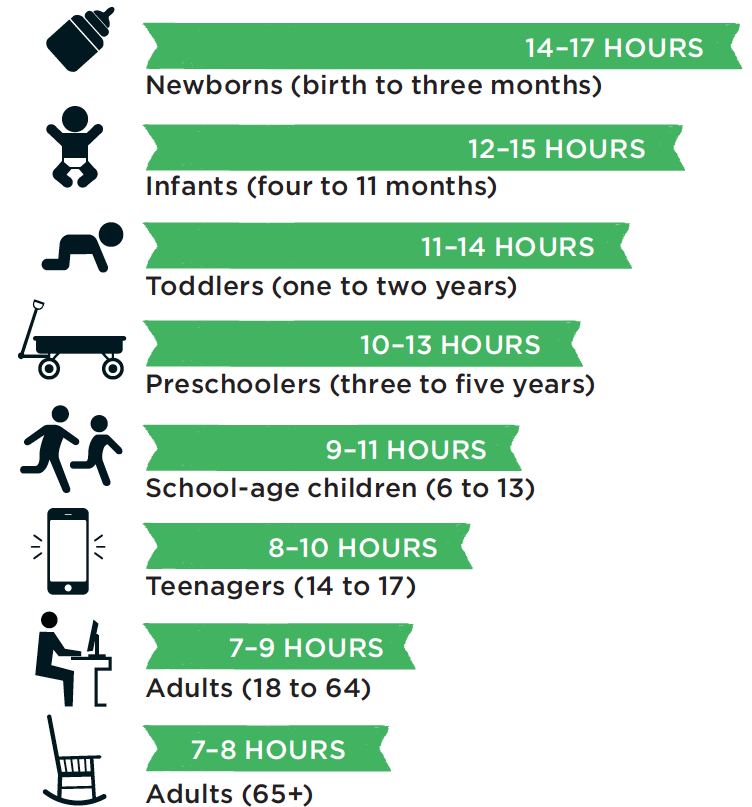
- Use a firm, flat sleep surface. Cover the mattress with a sheet that fits snugly.
- Do not put anything else in the crib or bassinet. Keep plush toys, pillows, blankets, unfitted sheets, quilts, comforters, sheepskins, and bumper pads out of your baby's sleep area.
- To avoid overheating, dress your baby for the room temperature and don't overbundle. Don't cover your baby's head while they're sleeping. Watch for signs of overheating, such as sweating or feeling hot to the touch.
- Keep your baby away from smokers. Secondhand smoke increases the risk of SIDS.
- Offer a pacifier to your baby at sleep time, but don’t force it. If the pacifier falls out during sleep, you don’t have to replace it. If you're breastfeeding, wait until breastfeeding is firmly established.
- Watch out for other hazards, such as items with cords, ties, or ribbons that can wrap around a baby's neck, and objects with any kind of sharp edge or corner. Look around for things that your baby can touch from a seated or standing position in the crib.
 Hanging mobiles, wall hangings, pictures, draperies, and window blind cords could be harmful if they are within a baby's reach.
Hanging mobiles, wall hangings, pictures, draperies, and window blind cords could be harmful if they are within a baby's reach. - Don’t let your baby fall asleep on a product that isn’t specifically designed for sleeping babies, such as a sitting device (like a car seat), a feeding pillow (like the Boppy pillow), or an infant lounger (like the Dock-a-Tot, Podster, and Bummzie).
- Don’t use products or devices that claim to lower the risk of SIDS, such as sleep positioners (like wedges or incliners) or monitors that can detect a baby’s heart rate and breathing pattern. No known products can actually do this.
- Don’t use weighted blankets, sleepers, or swaddles on or around your baby.
- Make sure that all sleep surfaces and products you use to help your baby sleep have been approved by the U.S. Consumer Product Safety Commission (CPSC) and meet federal safety standards.
Helping Your Newborn Sleep
Newborns follow their own schedule.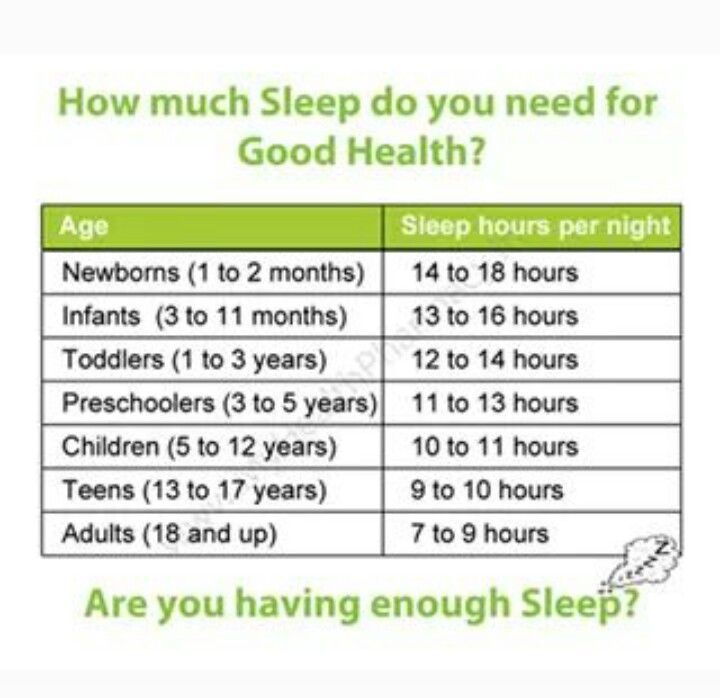 Over the next couple of weeks to months, you and your baby will begin to settle into a routine.
Over the next couple of weeks to months, you and your baby will begin to settle into a routine.
It may take a few weeks for your baby's brain to know the difference between night and day. Unfortunately, there are no tricks to speed this up, but it helps to keep things quiet and calm during middle-of-the-night feedings and diaper changes. Try to keep the lights low and resist the urge to play with or talk to your baby. This will send the message that nighttime is for sleeping. If possible, let your baby fall asleep in the crib at night so your little one learns that it's the place for sleep.
Don't try to keep your baby up during the day in the hopes that your little one will sleep better at night. Overly tired infants often have more trouble sleeping at night than those who've had enough sleep during the day.
If your newborn is fussy it's OK to rock, cuddle, and sing as your baby settles down. Swaddling (wrapping the baby in a light blanket) can also help to soothe a crying baby.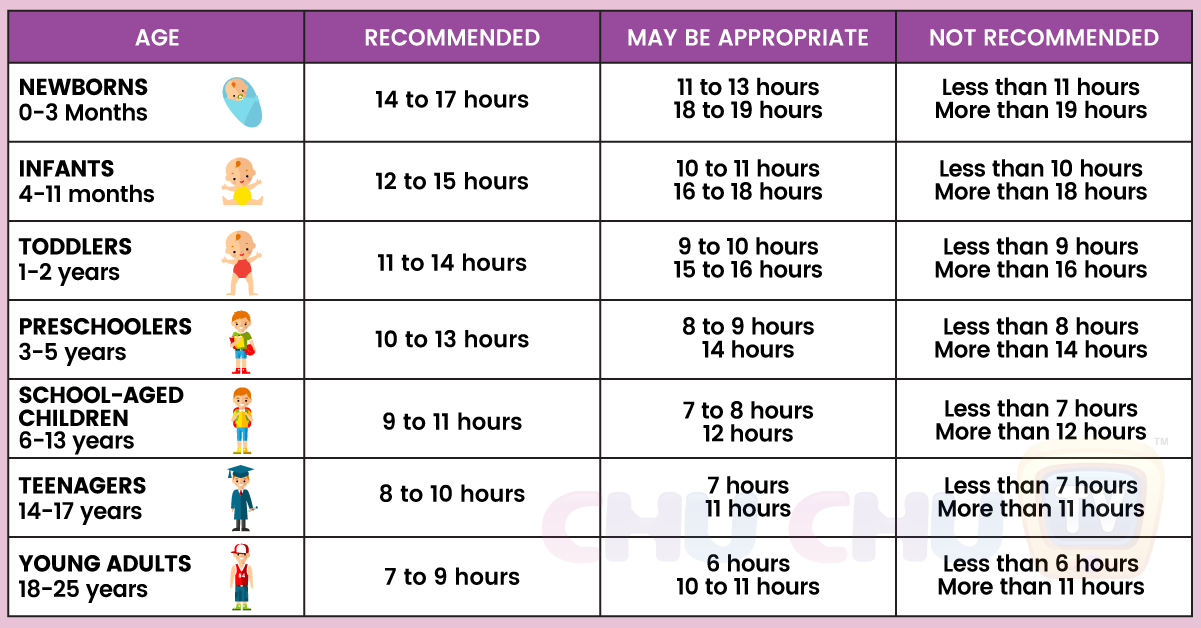 If you swaddle your baby and they start trying to roll over, that is a sign that you can stop swaddling. For the first months of your baby's life, "spoiling" is definitely not a problem. In fact, newborns who are held or carried during the day tend to have less colic and fussiness.
If you swaddle your baby and they start trying to roll over, that is a sign that you can stop swaddling. For the first months of your baby's life, "spoiling" is definitely not a problem. In fact, newborns who are held or carried during the day tend to have less colic and fussiness.
When Should I Call the Doctor?
While most parents can expect their newborn to sleep or catnap a lot during the day, the range of what is normal is quite wide. If you have questions about your baby's sleep, talk with your doctor.
Newborn Sleep: How Long Should a Newborn Sleep, and More
Newborns sleep a lot throughout the day and night, but only for short blocks of time. For you as a parent, waking through the night to soothe or feed your baby is what can be so exhausting about this period.
It’s natural to wonder how long your newborn should sleep for, what kind of sleep patterns may start to emerge, and how to establish a sleep routine so that your baby’s sleep becomes a little more predictable. We’ve got you covered in this comprehensive guide to newborn sleep.
We’ve got you covered in this comprehensive guide to newborn sleep.
How Much Sleep Do Newborns Need?
Every baby and child is different, and the amount of sleep each little one needs may vary. In general, though, newborns sleep for up to 16 or 17 hours in 24-hour period, but the sleep doesn’t happen all at once. Instead, very young babies will snooze in one- to three-hour blocks during both the day and night. All of this sleep is essential for your baby’s healthy and happy development. Over time, this haphazard round-the-clock dozing will become more organized, with more of your little one's sleep hours taking place at night.
What Are the Sleep Patterns of a Newborn?
Unlike adults, who typically sleep for at least seven hours at night and are awake for the rest of the day, newborns sleep in shorter blocks throughout both the day and night.
To give you a rough idea, in the first several weeks your newborn may sleep for about one to three hours followed by a short period of wakefulness before sleeping again.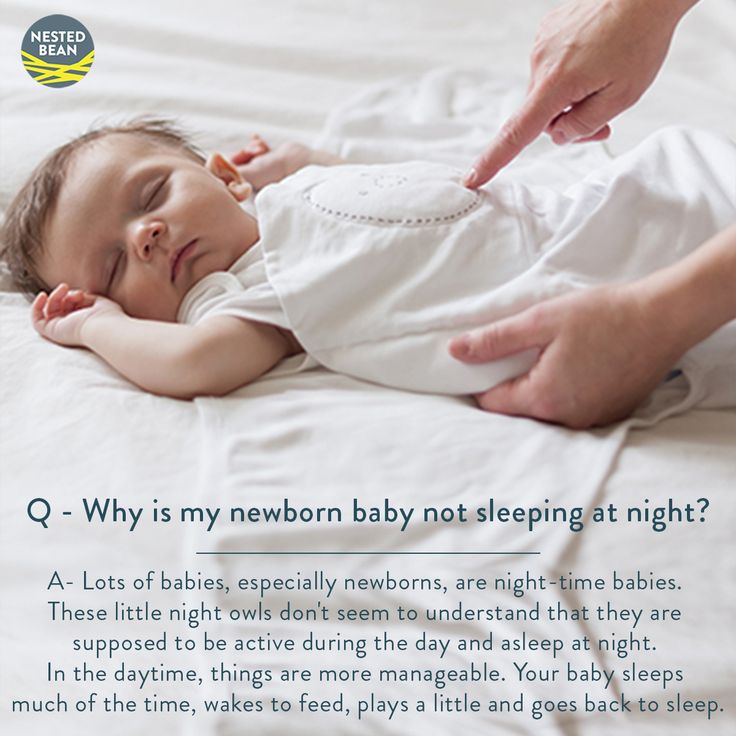 As the months go by, these sleep blocks may lengthen to become about four or five hours long.
By about 6 months of age, your baby’s sleep patterns may begin to look more like those of an adult, meaning your little one may sleep for longer stretches at night and be more wakeful during the day. Keep in mind that these extended bouts of nighttime sleep may be only about five or six hours long.
Although your 6-month-old may also be more active during the day, she will still need two or three daytime naps.
It’s important to remember that every baby is unique, and that your baby’s sleep patterns may differ from what we’ve described here.
The way sleep evolves from the round-the-clock blocks of a newborn to the longer nighttime sleep of an older child or adult is not a linear process.
You may find that your older baby sleeps for longer periods for a few months, but then reverts to waking up more frequently in the middle of the night. This is commonly referred to as sleep regression and is a normal part of development.
As the months go by, these sleep blocks may lengthen to become about four or five hours long.
By about 6 months of age, your baby’s sleep patterns may begin to look more like those of an adult, meaning your little one may sleep for longer stretches at night and be more wakeful during the day. Keep in mind that these extended bouts of nighttime sleep may be only about five or six hours long.
Although your 6-month-old may also be more active during the day, she will still need two or three daytime naps.
It’s important to remember that every baby is unique, and that your baby’s sleep patterns may differ from what we’ve described here.
The way sleep evolves from the round-the-clock blocks of a newborn to the longer nighttime sleep of an older child or adult is not a linear process.
You may find that your older baby sleeps for longer periods for a few months, but then reverts to waking up more frequently in the middle of the night. This is commonly referred to as sleep regression and is a normal part of development.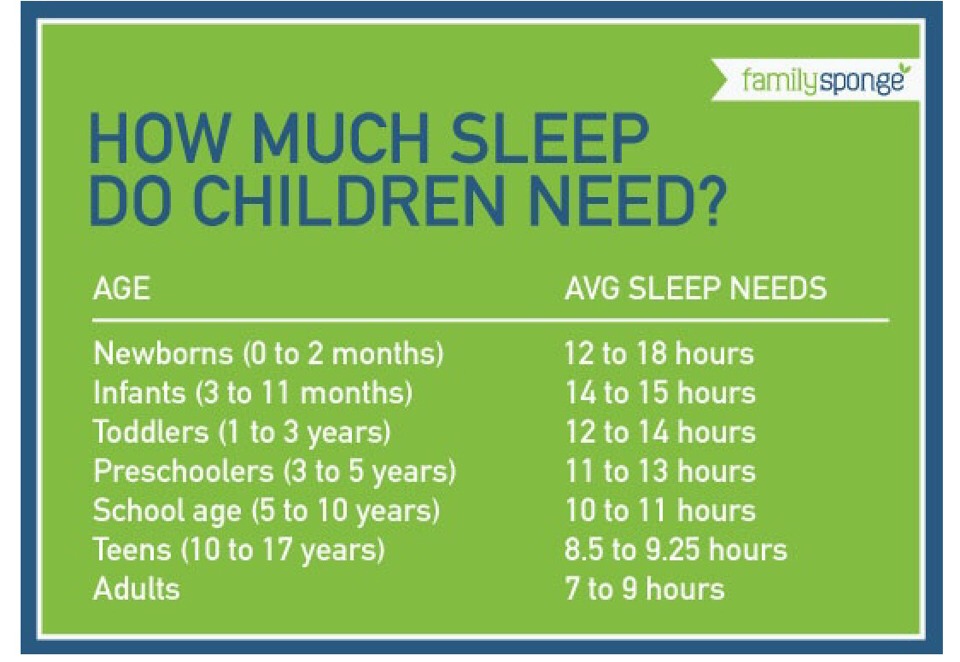 Sleep regression may occur when your child is feeling sick or unsettled, or when he’s going through a growth spurt or a developmental jump that affects his sleep patterns for a time.
That’s not all: Even once your child is sleeping through the night, at least one daytime nap may still be needed for many years to come.
Sleep regression may occur when your child is feeling sick or unsettled, or when he’s going through a growth spurt or a developmental jump that affects his sleep patterns for a time.
That’s not all: Even once your child is sleeping through the night, at least one daytime nap may still be needed for many years to come.
Stages of Sleep in Newborns
The sleep of newborns occurs in four stages: Stage 1: Drowsiness. Your baby becomes drowsy after a period of wakefulness and is ready to fall asleep. It’s a good idea to put your baby to sleep in her crib when she is drowsy and not yet asleep.
Stage 2: REM (Rapid Eye Movement) or active sleep. Your baby may start to twitch or jerk his arms and legs, and his eyes may move under his eyelids. His breathing may be irregular and stop for 5 to 10 seconds. This is referred to as “normal periodic breathing of infancy.” His breathing speeds up to a rate of between 50 and 60 breaths per minute, and this rapid pace lasts between 10 and 15 seconds.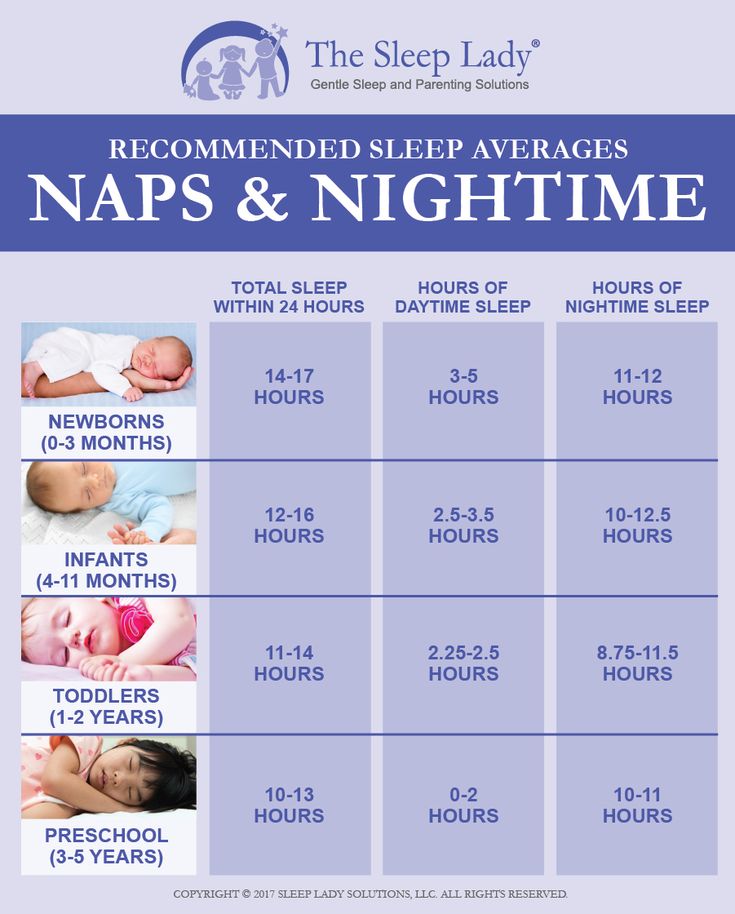 Then his breathing will return to a regular pace, with the cycle repeating. This type of breathing is completely normal for young babies, and your little one will eventually grow out of it by around 6 months old.
Then his breathing will return to a regular pace, with the cycle repeating. This type of breathing is completely normal for young babies, and your little one will eventually grow out of it by around 6 months old.
Stage 3: Light sleep. In this stage, your baby’s breathing is regular and sleep is not as active as in the previous stage.
Stage 4 and 5: Deep or non-REM sleep. Also known as quiet sleep, this is the stage your baby falls into a deep sleep. There is no twitching or any other movements. It may be difficult to wake your baby in this stage should you need to for any reason.
Don’t miss these must-watch sleep tips from a pediatric sleep consultant.
When to Set Up a Sleep Routine
It’s never too early to think about adding structure around your baby’s sleep, but keep in mind that it may be several months before your baby has a predictable sleep pattern.
Newborns don’t yet know the difference between day and night and their circadian rhythms are still developing.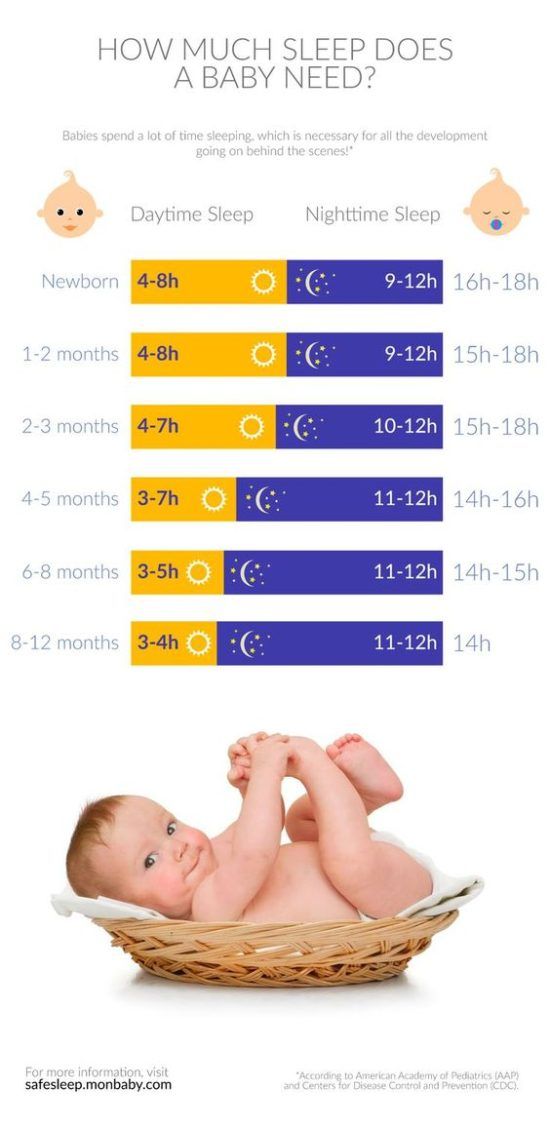 And because their stomachs are so small, newborns can only go for a few hours before they need to be fed again, even during the night.
At this early stage, it’s more important to cater to your baby’s feeding and sleep needs (and biological clock), rather than pushing a strict sleep schedule onto your little one. Look out for your baby’s drowsy periods and encourage (and allow) sleep then.
If you want, you can start keeping track of when your baby sleeps and feeds, and begin to put together a bedtime routine that you could follow consistently. Later on, when you may wish to start sleep training, having some basic sleep routines already in place may make things easier.
And because their stomachs are so small, newborns can only go for a few hours before they need to be fed again, even during the night.
At this early stage, it’s more important to cater to your baby’s feeding and sleep needs (and biological clock), rather than pushing a strict sleep schedule onto your little one. Look out for your baby’s drowsy periods and encourage (and allow) sleep then.
If you want, you can start keeping track of when your baby sleeps and feeds, and begin to put together a bedtime routine that you could follow consistently. Later on, when you may wish to start sleep training, having some basic sleep routines already in place may make things easier.
How to Set Up a Bedtime Routine
The idea behind a bedtime routine is to settle and relax your baby before putting her down in her crib for sleep, including for naps.
Because babies tend to love routine, having a simple ritual that you always follow helps your baby anticipate and learn that the time for sleep is coming, and helps her wind down.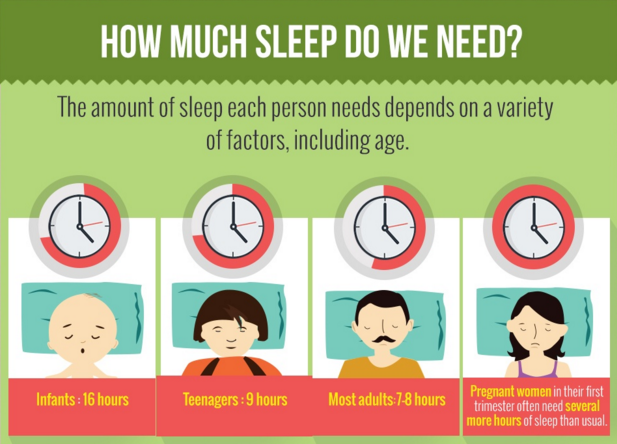 A bedtime routine can include a bath, a song or story, or a baby massage. Avoid any stimulating activities in the period just before sleep.
Make sure your baby is still awake (but sleepy) when you place him in his crib. This helps create a positive sleep association with the crib.
A bedtime routine can include a bath, a song or story, or a baby massage. Avoid any stimulating activities in the period just before sleep.
Make sure your baby is still awake (but sleepy) when you place him in his crib. This helps create a positive sleep association with the crib.
Will Your Newborn Be Able to Sleep Through the Night?
No, newborns can’t yet sleep through the night. They need to be fed every few hours, and typically sleep for short blocks of time.
Generally speaking, a newborn may be considered to be a “good sleeper” if she is able to go back to sleep by herself, without soothing from a parent, when she wakes in the night; if she settles down quickly after being fed or changed; or if a quick moment of comfort from a parent is all it takes for her to fall back asleep.
Some babies can self-soothe instinctively while others will need a little help to learn how. Remember, for a newborn, being a “good sleeper” doesn't mean not waking up; rather it means being able to return to sleep after a period of wakefulness.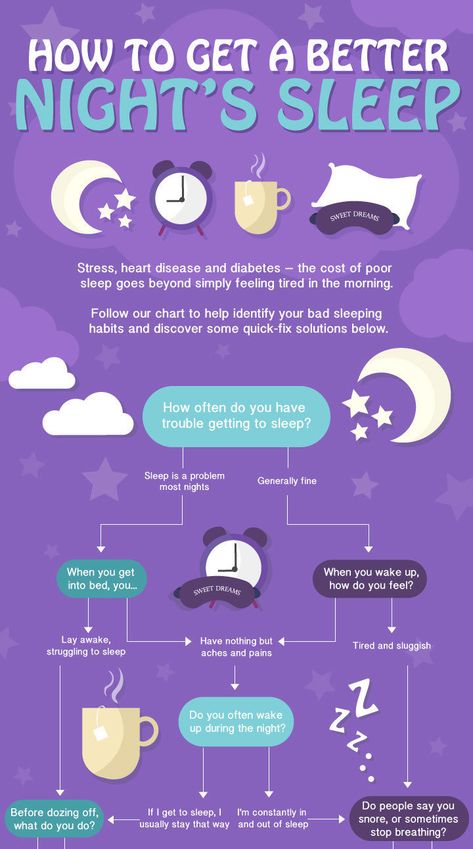 Know that it may take some time for your baby to learn how to self-soothe, and even once he does there may be some ups and downs throughout babyhood, toddlerhood, and beyond.
Know that it may take some time for your baby to learn how to self-soothe, and even once he does there may be some ups and downs throughout babyhood, toddlerhood, and beyond.
How to Get Your Newborn to Sleep at Night
All babies cry, and all parents experience a crying baby at night from time to time. There are many reasons your newborn may cry at night, rather than falling or staying asleep. For example, she may be uncomfortable or overstimulated, or may need a diaper change. Here are some of the things you can try to help your baby settle and fall asleep:
Check that your newborn is comfortable. Check that your baby isn’t hungry, doesn’t have a wet diaper, and isn’t feeling sick. You may also like to check the room temperature to make sure it’s comfortable for sleep, and that your little one isn’t under- or overdressed.
Comfort your baby. Soothing methods can include rocking him, patting him, or letting him suck a thumb or hand.
 If you are nursing your baby and it's going well, usually by around 3 to 4 weeks of age you can also offer a pacifier. However, never put your baby in the crib with a bottle. The natural sugars in breast milk and formula can create a residue in your baby’s mouth that may cause a condition called nursing bottle caries, a form of dental decay. Also, any liquid that pools in your baby’s mouth can back up into his ears and trigger an ear infection.
If you are nursing your baby and it's going well, usually by around 3 to 4 weeks of age you can also offer a pacifier. However, never put your baby in the crib with a bottle. The natural sugars in breast milk and formula can create a residue in your baby’s mouth that may cause a condition called nursing bottle caries, a form of dental decay. Also, any liquid that pools in your baby’s mouth can back up into his ears and trigger an ear infection.
Look for signs of sleepiness or tiredness. Whenever possible, put your baby in his crib when he’s drowsy but not yet asleep. This will help him learn that the crib is the place for sleep. Look for cues that your baby is getting tired, such as drooping eyelids, rubbing the eyes, or fussiness.
Be playful with your baby during the day between naps. When she’s awake, talk and play with her so that the day is filled with activity. This will help her learn that the daytime is the more active period.
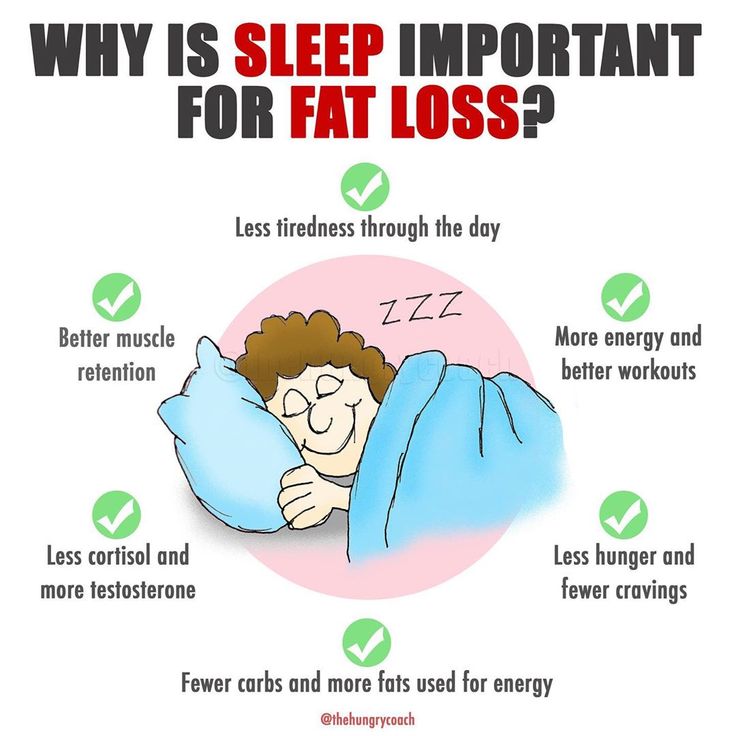 All this stimulation may also help her sleep better and fall asleep faster during daytime naps and at night.
All this stimulation may also help her sleep better and fall asleep faster during daytime naps and at night.
Keep things calm at night. During middle-of-the-night feedings and diaper changes, be brief, calm, and “boring.” Keep the lights dim, speak in a quiet voice, and return your baby to her crib right away when you’re done. This will help your baby learn the difference between daytime wakefulness (which is active and fun) and nighttime wakefulness (which is a quiet, shorter period of wakefulness before returning to sleep).
Don’t respond to your baby’s cries immediately. When your baby wakes up in the middle of the night, give him a chance to fall back asleep before racing in. If he doesn’t stop crying, then quietly go to him. Reassuring him that everything is OK and that it’s time to sleep, and gently stroking him may be all the comfort he needs to fall back asleep. Some babies just need to have a little cry before falling asleep.
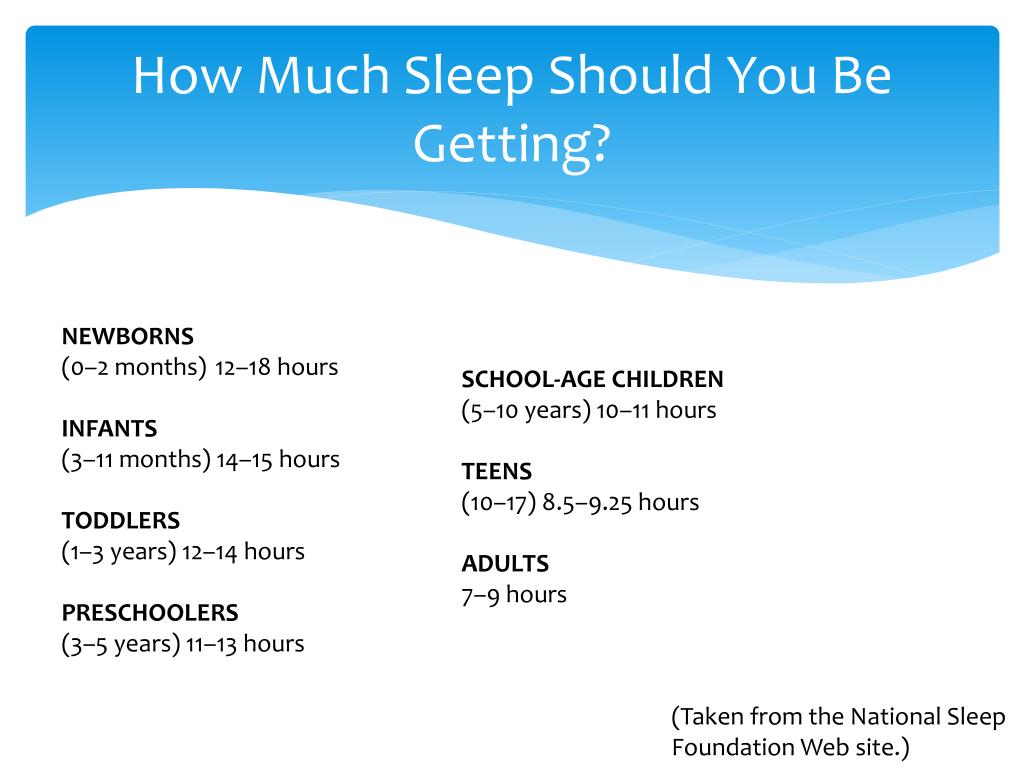
Play some soft music or white noise. Some babies may be soothed to sleep with the help of soft music or white noise. A fan pointed at the wall or a baby sound machine can produce white noise, which can also help mask household sounds that may otherwise disrupt his sleep.
Track your baby’s sleep. Keeping track of your baby’s sleep, including naps, can help give you a better idea of how much sleep she’s getting and when she might be ready for the next sleep block. Tracking is easy with the Smart Sleep Coach by Pampers™, download it today and make use of it's simple 1-click sleep tracking and dynamic schedule feature that updates with each sleep.
Above all, try not to become stressed if your little one can't seem to sleep; never act on any frustration you may be feeling by shaking or hitting your baby. Instead, leave your baby safely in his crib for a few minutes while you regroup in another room, and go back in when you feel calm and ready.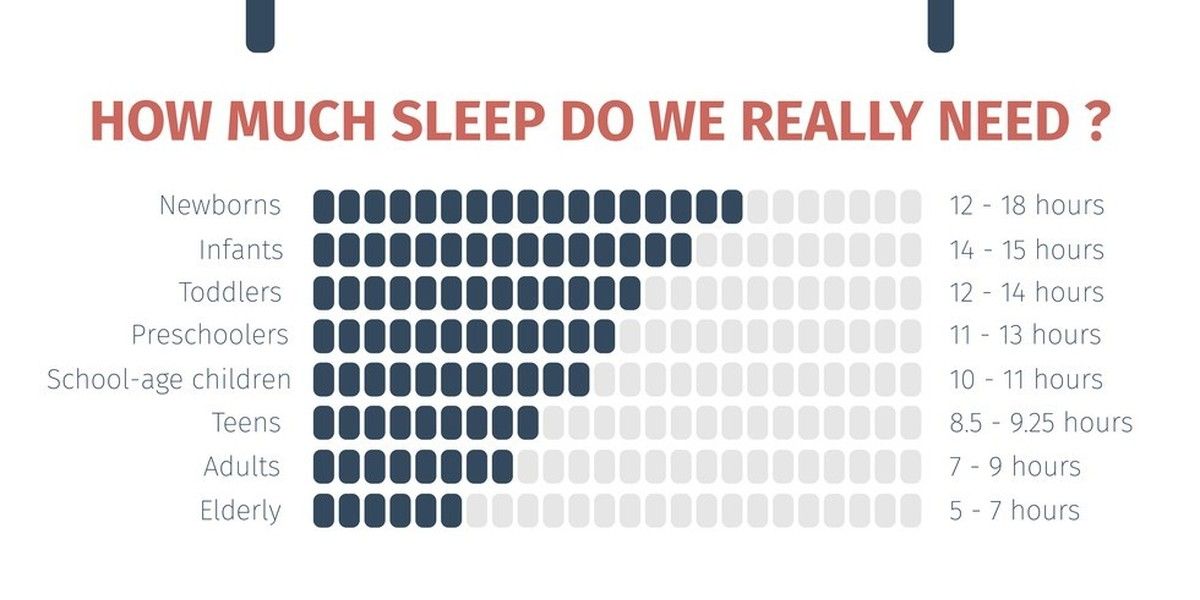
How Long Do Newborns Sleep at Night?
On average, newborns will sleep for around 16 or 17 hours in a 24-hour period, but in one- to three-hour stretches. This means your baby will sleep for several short blocks at night, totaling about eight hours altogether. Remember, since every baby is different, your baby may sleep more or less at night than this. As a general guide, here’s how much of your newborn’s total sleep time occurs during daytime and nighttime, and how those hours shift month by month:
Can Newborns Sleep Too Much?
Many parents wonder whether their baby is sleeping too little or too much. This is an understandable concern, as you want your baby to be sleeping just the right amount.
In your newborn’s first weeks, she’ll need to be fed about every three to four hours. If your newborn sleeps longer than four hours, you may need to wake her up for a feeding.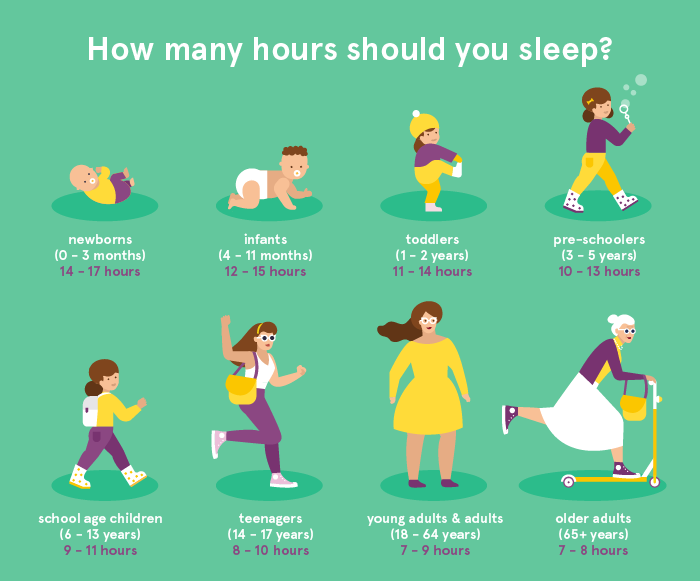 Check in with your baby's healthcare provider on this matter. Depending on your baby's weight, age, and general state of health, your provider may recommend waking her up or letting her sleep.
If your baby's afternoon naps are longer than three or four hours, it’s a good idea to wake her up for a feeding and some playtime. Naps that are too long or too close to bedtime can make falling asleep in the evening harder.
Check in with your baby's healthcare provider on this matter. Depending on your baby's weight, age, and general state of health, your provider may recommend waking her up or letting her sleep.
If your baby's afternoon naps are longer than three or four hours, it’s a good idea to wake her up for a feeding and some playtime. Naps that are too long or too close to bedtime can make falling asleep in the evening harder.
Can Newborns Sleep for Six Hours Straight?
A newborn most likely will not be able to sleep for six hours straight. Newborns typically sleep in one- to three-hour chunks of time and also need feedings every three to four hours. Either your newborn will wake up on his own when he’s hungry, or you’ll need to wake him, depending on the advice of your healthcare provider.
A Note on Newborn Baby Sleep Safety
A safe sleep environment is very important. Here are some important sleep safety recommendations to follow:
Here are some important sleep safety recommendations to follow:
Put your baby to sleep on his back. For your baby’s first year, he should always be put to sleep on his back, whether it’s for a nap or nighttime sleep. Babies who sleep on their backs have a reduced risk of Sudden Infant Death Syndrome (SIDS) compared with babies who sleep on their sides or stomachs.
Use a firm sleep surface. Ensure that the crib mattress is firm and meets the safety standards set by the U.S. Consumer Product Safety Commission (CPSC). Cover the mattress with a tight-fitting bottom sheet and make sure the mattress fits the crib or bassinet perfectly, with no gap between the mattress and the sides of the crib.
Make sure the crib is completely empty. Your baby’s crib should be clear of pillows, blanket, quilts, plush toys, and bumper pads. Any of these items can turn into a suffocation hazard.
Room-share with your baby.
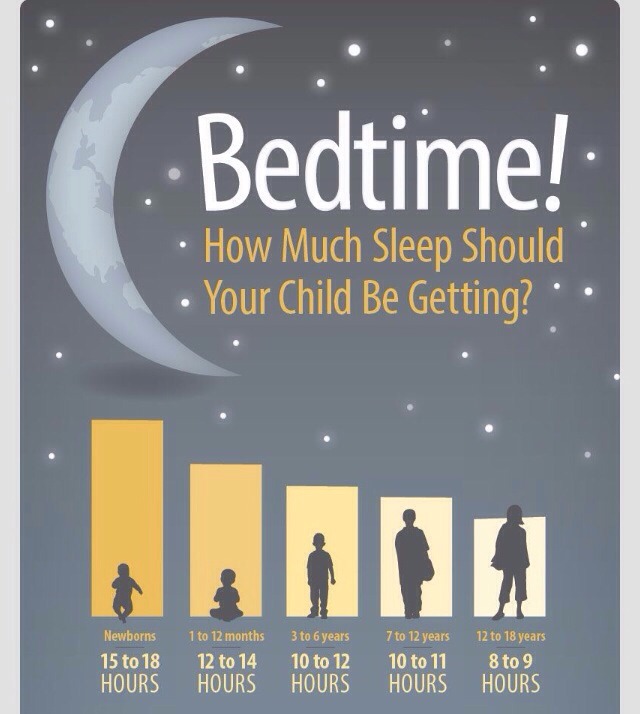 It’s recommended that your baby sleep in the same room as you, but on a separate sleep surface, for her first six months and even up to her first year. Room-sharing can make it much easier for you to attend to your baby during the night.
It’s recommended that your baby sleep in the same room as you, but on a separate sleep surface, for her first six months and even up to her first year. Room-sharing can make it much easier for you to attend to your baby during the night.
Don’t bed-share with your baby. It’s OK to bring your baby into bed with you for a feeding or for some comforting, but be sure to put your baby back in his crib as soon as you’re done. Check that your bed is clear of anything that could lead to suffocation, such as pillows, blankets, and loose sheets, just in case you fall asleep during a feeding. If you do doze off, place your baby back in his crib on his back as soon as you wake up. Keep in mind, experts don’t recommend bed-sharing for sleep as it can be dangerous for your baby.
The Bottom Line
Newborns sleep a lot, and the fact that they doze only in shorts bursts around the clock can make this period so tiring for you as a parent.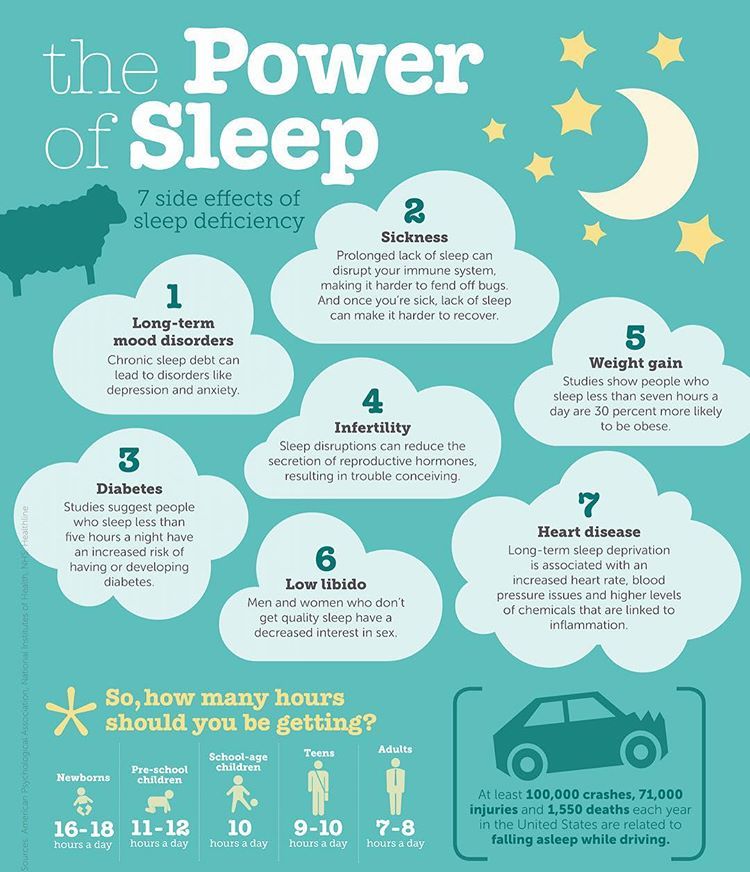 Hang in there and try to get some rest whenever you can. Consider sharing middle-of-the-night feedings and diaper changes with your partner, and accept help from close friends and family so that you can have some down time.
Try to remember that this exhausting newborn period will pass; eventually your baby will sleep for longer stretches and have more predictable sleep patterns. In time, the sleep-deprived fog of this newborn phase will clear, and you may even come to look back fondly on this bleary-eyed period.
Hang in there and try to get some rest whenever you can. Consider sharing middle-of-the-night feedings and diaper changes with your partner, and accept help from close friends and family so that you can have some down time.
Try to remember that this exhausting newborn period will pass; eventually your baby will sleep for longer stretches and have more predictable sleep patterns. In time, the sleep-deprived fog of this newborn phase will clear, and you may even come to look back fondly on this bleary-eyed period.
Children's Clinical Medical Center of Chita
Sadly, pediatricians are increasingly stating the fact that modern children do not get enough sleep. And the lack of sleep in a child is much more dangerous than the lack of sleep in an adult. Children who sleep significantly less than normal grow more slowly and develop worse than their peers. This is easily explained.
First, growth hormones are produced during sleep.
Secondly, a good sound sleep contributes to a better memorization of previously received information.
Thirdly, general weakness due to lack of sleep makes it difficult to fully assimilate information.
In addition, the immune system is weakened in children with little sleep and the likelihood of developing diseases of the cardiovascular system increases. Sleep-deprived children become nervous, absent-minded, fussy. This applies to all children, regardless of their age: Babies and teenagers alike should sleep well.
Parents are obligated to provide their child with adequate and healthy sleep.
For children, as for adults, the normal amount of sleep is individual. Some kids sleep more, some less. The figures given by doctors are an average. In general, they should strive for. These figures reflect the total amount of sleep per day, that is, taking into account both night sleep and daytime sleep.
- Newborn baby sleeps an average of 18-22 hours a day.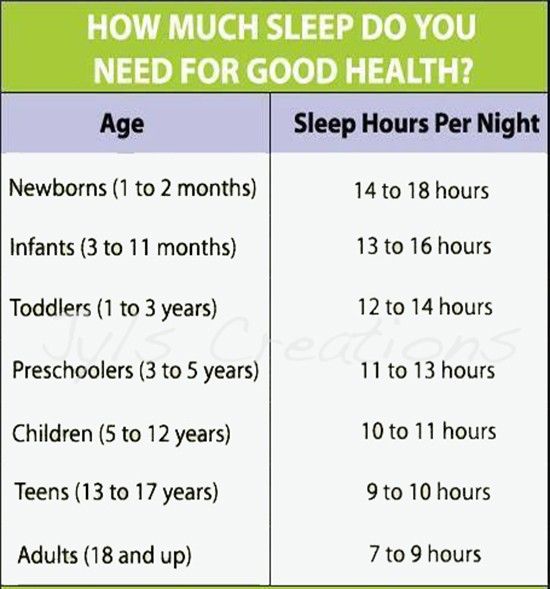
- Baby from 1 to 3 months old sleeps 18-20 hours.
- A 3-4 month old baby can sleep 17-18 hours.
- A 5-6 month old baby must sleep at least 16 hours.
- Baby 7 to 12 months old sleeps 14 to 16 hours a day.
- A child from 1 to 1.5 years old must sleep at least 10-11 hours at night and 3-4 hours during the day. In general, at least 14 hours a day.
- A child from one and a half to 2 years old must sleep at least 10-11 hours at night and 2-3 hours during the day. In general, at least 13 hours a day.
- Child 2 to 3 years old must sleep at least 10-11 hours at night and 2-2.5 hours during the day. In general, at least 12.5 hours a day.
- Children 3-4 years old should sleep at least 10 hours at night and 2 hours during the day. In general, at least 12 hours a day.
- Children 5 to 7 years of age should sleep at least 9-10 hours at night and 1.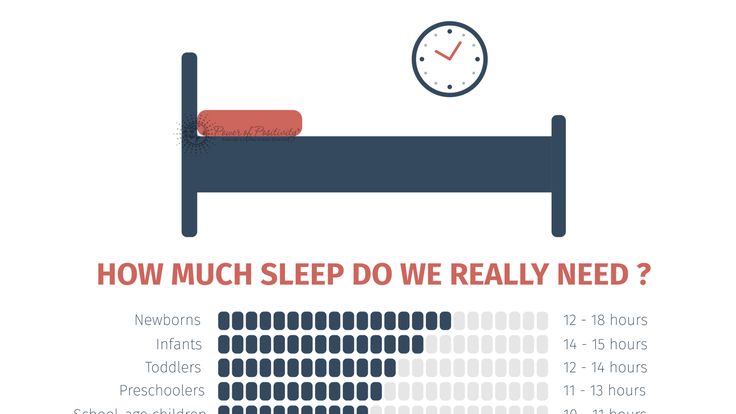 5-2 hours during the day. In general, at least 10.5-11 hours a day.
5-2 hours during the day. In general, at least 10.5-11 hours a day.
- Pupils of elementary school may not sleep during the day. At night, they should sleep at least 9 hours, preferably 10 hours.
- Adolescent needs at least 9 hours of sleep per night.
- high school students should sleep an average of 8 hours per night.
In order for the child to get enough sleep, it is necessary to follow the regimen and put him to bed at the same time. This is especially true for night sleep. Make it a rule to put the child to bed, for example, at 21 o'clock. And never deviate from this rule. Let there be guests in the house, let the child become interested in the game, let the parents have things to do - everything should be postponed for the sake of the child's sleep. If he gets used to going to bed at the same time, nothing will prevent him from relaxing in time and wanting to sleep. No game will seem more attractive to him than a fresh warm bed and a cozy pillow.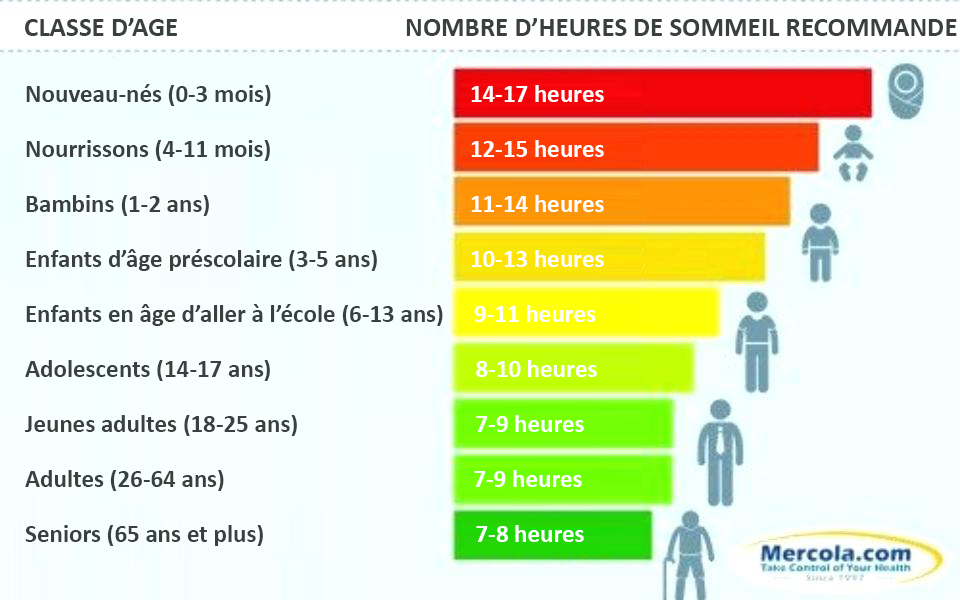
2. Preparation for sleep, relaxation, rituals.
In order for the child to fall asleep easily and quickly, already an hour or two before bedtime, he must be in a calm atmosphere. Noisy games, difficult puzzles, intellectual tasks, homework preparation, computer games, watching noisy long movies and cartoons, listening to loud music, etc. - all this should end an hour or two before going to bed. The kid at this time can calmly play with toys or listen to a fairy tale read by his mother. An older child can read by himself, chat with his parents, watch a calm movie. Yes, and not so much time will be left for quiet leisure, because direct preparation for sleep will require a lot of time. It is necessary to take a shower, brush your teeth, straighten the bed, change into pajamas, drink some water, etc. The same actions performed day after day before going to bed become a kind of ritual, the performance of which also helps the child tune in to sleep. And this, in turn, contributes to faster and deeper falling asleep and, as a result, better rest. If, for example, a few sips of water before bedtime suddenly become a habit, do not try to wean your child from it. Let this be your ritual helper. If a child is used to parents reading a fairy tale to him, then he needs to read, regardless of employment.
If, for example, a few sips of water before bedtime suddenly become a habit, do not try to wean your child from it. Let this be your ritual helper. If a child is used to parents reading a fairy tale to him, then he needs to read, regardless of employment.
3. Lightness in the stomach.
The last meal should be 2 hours before bedtime (this does not apply to infants and children who are breastfed). Shortly before bedtime, a child can drink a cup of tea with 1-2 cookies or a glass of kefir, but not with a high-calorie sandwich. Firstly, with ease in the body falls asleep more soundly. Secondly, dense high-calorie snacks before bedtime are bad for the stomach.
4. Comfortable atmosphere in the room.
The room must be well ventilated before putting the child to bed. If the room is dry, after airing it is worth turning on the humidifier and bringing the humidity level to an acceptable level. When the child goes to bed, you need to turn off the light, you can leave a dim nightlight if the baby asks for it.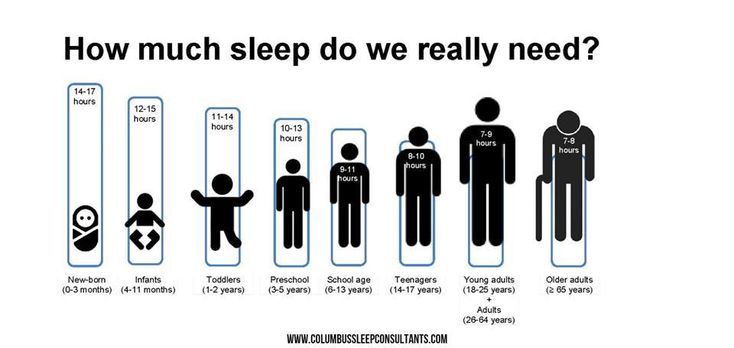 In no case should children be put to bed with the TV turned on or a flickering computer monitor. However, it is impossible to turn on the TV, the overhead light and the sound of the computer speakers even after the child falls asleep. Light noises and light may not wake him up, but they will make the child's sleep superficial, because of this, the body will not get proper rest. If this happens consistently, the child will show signs of sleep deprivation. That is, he seems to be sleeping as much as necessary, but still does not get enough sleep. The reason is the lack of conditions. The room where the child sleeps should be fresh, dark and quiet.
In no case should children be put to bed with the TV turned on or a flickering computer monitor. However, it is impossible to turn on the TV, the overhead light and the sound of the computer speakers even after the child falls asleep. Light noises and light may not wake him up, but they will make the child's sleep superficial, because of this, the body will not get proper rest. If this happens consistently, the child will show signs of sleep deprivation. That is, he seems to be sleeping as much as necessary, but still does not get enough sleep. The reason is the lack of conditions. The room where the child sleeps should be fresh, dark and quiet.
Sleep is very important for a child's normal growth and brain development, and regular lack of sleep can lead to serious illnesses. Create the conditions for your baby to fall asleep and carefully make sure that nothing interferes with his full sleep.
How much sleep does my baby need?
Your baby will learn to distinguish between day and night only gradually. ..
..
Each child has his own individual rhythm of sleep and nutrition, as well as an individual need for them. Just in newborns in the first weeks of life, the ability to distinguish between day and night has not yet been developed. Opportunities to influence this rhythm are extremely limited.
Parents can support the child in his development, but the child determines his own biorhythm. Some newborns have a pronounced tendency to a regular daily routine. Such children begin to sleep early at night without waking up. Other babies experience the need for food and sleep at completely different hours of the day and night for months. They need the support of their parents in order to develop a systematic or compatible biorhythm with the whole family.
It is important to have a consistent, relaxed daily routine with regular meals, bedtime, and other activities such as walking or rituals. A constantly recurring daily routine, including bathing, feeding, an evening story or a lullaby, soothes. Please don't forget to replenish your energy reserves too: make sure your diet is balanced, drink enough fluids and give yourself some rest during the day.
Please don't forget to replenish your energy reserves too: make sure your diet is balanced, drink enough fluids and give yourself some rest during the day.
In the first weeks of life
During the first weeks, it seems to you that your baby sleeps almost all day - in fact, newborns sleep about 18 hours a day, most often 4 hours. Sleep is interrupted by wakefulness phases during which the baby is fed, swaddled and played with.
In the first 4-6 months of life
In the first 4-6 months of life, the baby learns to distinguish between day and night. After all, children are not born with this skill, and their internal clock is adjusted after birth, focusing on the daily routine of the family. Over time, frequent short sleep phases will be replaced by longer sleep. At the same time, the phases of wakefulness gradually become longer.
From 6 to 12 months
From 6 to 12 months, most children sleep about 11 hours at night and 2 times a day for 1-1.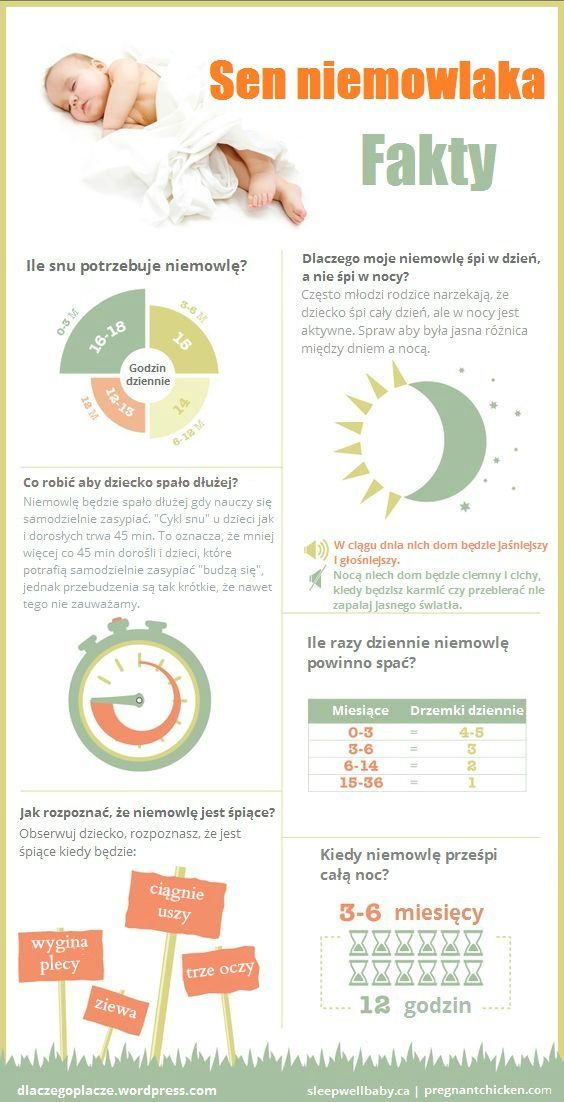 5 hours. Longer daytime naps are not recommended as this may interfere with your baby's nighttime sleep.
5 hours. Longer daytime naps are not recommended as this may interfere with your baby's nighttime sleep.
Some parents are reluctant to wake up their baby, believing that the baby's body needs sleep. However, in order for a healthy biorhythm not to be disturbed, babies who sleep too long during the day should be slowly awakened. It's better for your baby to be a little naughty after that than if he stays up at night and demands attention. Use your baby's daytime wakefulness phases for intensive activities with him. The longest phase of wakefulness - 4-5 hours - should be before a night's sleep. This will help your baby fall asleep easily in the evening and sleep soundly at night.
In the second year of life
In the second year of life, children need about 13 hours of sleep per day. If at the same time 11 hours fall at night, then there is time for daytime rest. Some children already at the age of 10 months sleep only once a day, others are not in a hurry with this innovation until 1.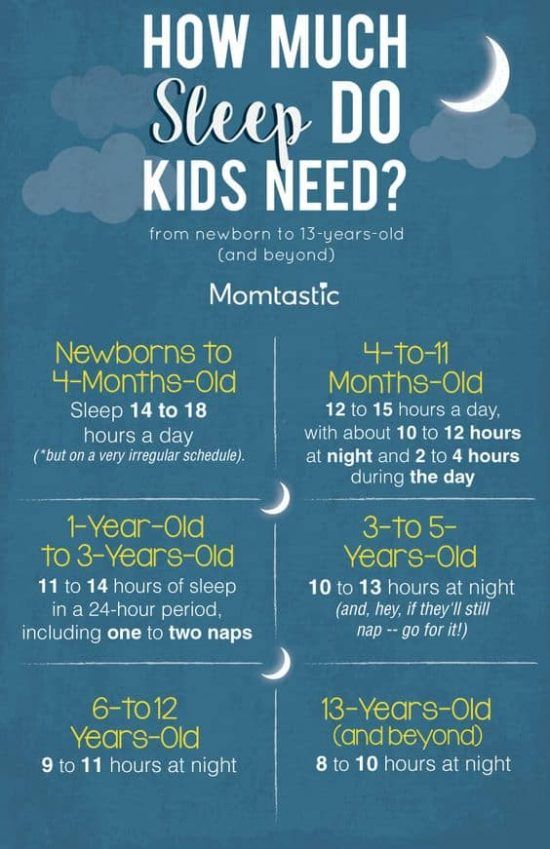

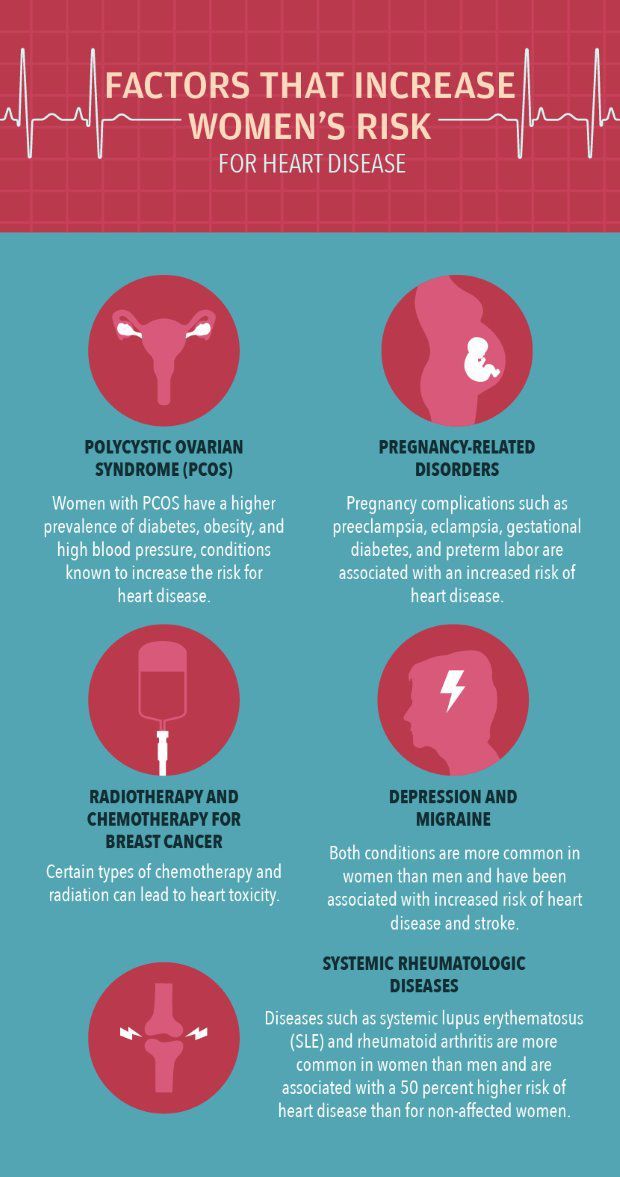



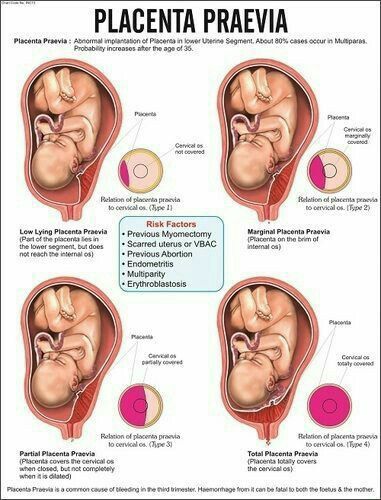
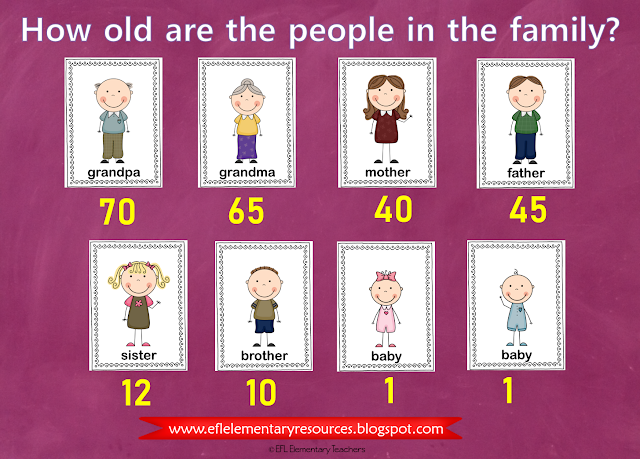


:max_bytes(150000):strip_icc()/recognizing-and-treating-a-yeast-diaper-rash-284385_V3-aecf9328ee0b491992c051f490e5a4bf.png)


